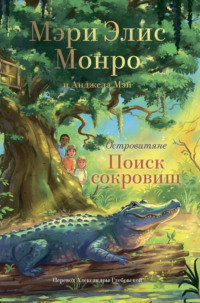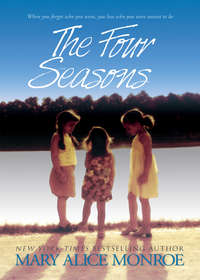
Полная версия
Girl In The Mirror
Behind him came the high-pitched welcomes of his mother and his sister, Rosa, and behind them, Rosa’s children. More slowly, his brother Bobby sauntered forward. As he embraced them one by one, he could smell the heady scent of a Mexican Christmas on their clothes, in their hair and lingering in their kisses. Dark chocolate, vanilla and oranges.
Once inside, he was tempted to walk around the family home, to peek into bedrooms and closets, to see if he still had a room. He felt nervous. Out of place. The family clustered around him, however, chatting amiably, reminiscing over events that were far sweeter in memory. After a few minutes the conversation slowed, but this was to be expected. After all, it’d been several years since he’d been home. His ear was quick to pick up the soft, intimate sounds of Spanish, the language of his family. Michael could feel his tongue stumble around the vowels and consonants as he struggled with his broken replies.
“Little Francisco speaks better Spanish than his uncle Miguel,” his mother teased. Michael only smiled. This was an old stalemate that had begun when Michael, the only Mexican in his suburban first grade class, announced one night at family dinner that he would only speak English as the nuns had instructed him to. His mother, hurt and confused, had ceased her fluid flow of Spanish and met his announcement with obedience. “If the nuns said so…”
His father had responded typically, exploding in anger and casting him off to his room, where Michael preferred to be, anyway. It was the beginning of the unraveling of his ties to his family. The first step in the distance he was to create between them.
Tonight there was no criticism in Luis’s eyes, however. He beamed at his youngest son.
“Rosa,” Luis boomed to his daughter. “Settle your children. I want to talk to Miguel alone for a moment.” He guided Michael to the large family kitchen. Closing the door, he paused and sighed a bit theatrically. “Ah, some peace and quiet, eh? If I could harness the energy of those bebés, I could live forever! But—” he shrugged with his whole body, arms and palms lifting upward “—I’ll settle for a small glass of beer.”
“Ah, Mama,” Michael said, accepting a bottle and sniffing the air. The familiar scents of Mexican cooking, mingled with the sounds of children laughing and grown-ups talking in Spanish in the room next door, was like a soothing balm, restoring his sense of place.
“Smells like heaven.”
Marta said nothing, but her skin flushed with pleasure as she hovered over the huge stove covered with simmering pots. He and his father leaned against the wood counter in the delicious-smelling room, arms crossed, bottles held in fists as they began the awkward conversation that always followed months of separation.
“So,” Luis began. It was more a clearing of the throat.
“How are you?”
“Fine…fine,” Michael responded slowly. He hoped he didn’t sound cautious, and took a long swallow of beer.
“Real good.”
“What you doing in Chicago?”
He shrugged. “Same old, same old. Mayor Daley wants more trees planted, so when we finish a building, we plant him more trees.” Father and son exchanged glances over their bottles and shared a mutual laugh.
“Glad to see you’re still planting something.”
They tried hard to maneuver their conversation into friendly territory, and the occasional quips Marta offered as she stirred at the stove helped. Yet it was clear to Michael that his father was pining to talk plainly but didn’t want to push his son hard the moment he stepped in the door. Luis was a tall, big-fisted and broad-shouldered man with a voice to match. Seeing him stutter over inanities was like watching a bull stumble in a china shop. Michael decided to make it easier for him.
“The nursery looks hard hit,” he opened, going straight to the point.
Luis’s face revealed surprise, immediately followed by relief. He began to nod his burly head widely. “Yes, yes, exactly!” he boomed, stretching out his arm in agreement. “The drought last year, aieee! We lost so much, and what is left—” he shook his hands to the heavens “—it’s not fit to live. Son of a bitch drought. Grass burn like hell, and the people call and say, ‘No cut.’ When we no cut they no pay. Do they care? No! ‘No cut’ is all they say.” He shook his head. “So much dies.”
“I heard it was bad. I’m sorry you were so hard hit.”
Luis shrugged. “Will of God, no?”
“Perhaps…” He took a long swallow of beer, avoiding a religious debate. In the Mondragon household, life’s twists and turns were all part of God’s infinite plan. To be endured. “How is Manuel doing?” Michael didn’t know his brother-in-law very well. He seemed a decent sort of fellow, but the man would have to be a saint to live with his hot-tempered sister, Rosa.
His father shrugged noncommittally. “He does okay cutting the lawns. The men they like him, but…” Luis rubbed his jaw. “It’s not just drought. He no can draw the land pictures like the people want now. They want something special, you know? And if you can draw the pictures, you can sell stock, too. Draw for free sometimes, just to get the job.”
“I know what you mean, Papa. It’s common now. Why didn’t you hire someone? A designer?”
“Why I go hire someone when my son is best there is?”
Michael’s sigh rumbled in his chest. “Perhaps because I’m an architect in Chicago? Papa, I build skyscrapers. High in the sky.” He ground his teeth and said softly, “I don’t dig in the earth anymore.”
“Madre de Dios. How can you like working away from the soil? What you want to play with concrete blocks for in Chicago when you can have all this fine California earth? This precious land. I ask you!”
Michael heard the pleading hidden in the boisterous exclamation and it broke his heart. His father was a proud man, raised harshly as an orphan by his relatives in Mexico. At twenty-two he brought his family to America because a bachelor uncle had died and left a small piece of California land to his only living nephew. From the moment he’d seen the fertile valley, Luis Mondragon’s life had had purpose. He’d turned a deaf ear to the many lucrative offers for the land and held on tight to his future—a risky move for a poor Mexican with three hungry children.
When he’d saved enough money, Luis had moved his ragtag family to the suburbs and established a modest lawn maintenance company. He slaved in suburban yards from dawn till sundown seven days a week, like a huge bull in the harness. Luis hated the suburbs, but Marta had wanted the good “gringo” schools where the nuns would teach her children the same things as white children. Besides, what could he do? The suburbs was where the money was. The people liked his wit and strong back, and his business thrived. When the boys grew older they helped run the mowers and hedge clippers, working for a pittance.
Though his father may have been cheap with a dollar, he was very generous with his knowledge. Like his precious nursery, he nurtured his boys, teaching Roberto and Miguel about the soil, stock and the family secrets for a vigorous plant. Every spare penny earned went back to the land. When at last he could begin a nursery, he sold only a few select plants, just the ones his customers were likely to buy. Then, slowly, with his twinkling eyes and infectious laughter, he teased his customers to “try something a little bit different, no?” Plant by plant, Luis built the reputation of the Mondragon nursery, and Michael knew it had to break the old man’s heart to see a lifetime of struggle strangled by heat, drought and competition. Looking at his face now, he saw how the drought had coursed new crevices in his father’s handsome face as well.
“What would you have me do, Papa?” he asked simply.
His father searched his face, then relaxed with a satisfied, proud grin. “Ah, Miguel. You are a true son to me. Sí! I see so much of me in you.”
Michael stepped back from the bear hug, rebelling against the comparison. He wasn’t like his father. Not at all. “Papa…”
“You see, Marta?” Luis interrupted, tightening his possessive arm around Michael’s shoulders. The force of his will flowed through him. “I told you my son would help me. I have one good son.”
Michael met his mother’s gaze over his father’s head.
“No, Luis,” she replied somberly. “You have two good sons.”
When the feast was prepared, the family gathered around the long, dark wood table while Marta served the family favorites with pride. Ceviche, roast leg of pork in adobe sauce, corn pudding and green rice. For dessert, Marta insisted on no less than four cakes with fresh strawberries and cream.
“Sit down now, Marta,” bellowed Luis. “Enough! You run like a rabbit. It makes me tired just to watch. Sit! It is time to eat.”
Clucking her tongue while scanning the table for any missing salt shakers, butter or salsa, Marta reluctantly took her seat beside Luis.
While Luis led the family in prayer, Michael studied the faces collected at the table. His family reflected Mexico’s rich and diverse history. His father was still a virile, handsome man. Tall, with dark hair boldly streaked with gray and heavy, bushy brows. His mother, Marta, had skin as fair and glowing as the Madonna in the May holy card pictures she adored. Her brown and gray hair, rolled smoothly back into a bun, accentuated the delicate, patrician features that reflected her Spanish descent.
His brother, Bobby, was the most like her. His hair was as blond as hers once was, his skin as light and his frame as delicate. His cocky smile carved deep dimples into a face already over-blessed with good looks. His sister, Rosa, was also fair. But to her lifelong dismay, she was tall and wide in the shoulders, like himself and their father, a large woman able to lift heavy machinery and do a man’s day of work. Luis had often complained bitterly to Marta that she had somehow gotten the genes between Bobby and Rosa mixed up.
Michael grew up knowing that of all the family, his features were the most Indian-like. Unusually tall, like his father, his skin was the darkest, his hair the coarsest and his face as severely chiseled as any Mayan statue. Of the three Mondragon children, only he’d been given a nasty push from behind by the local suburban boys after school.
“We do not come together every Christmas,” began Luis, his dark eyes gleaming white against terra cotta skin as he stood at the table, a glass of wine held in a toast.
“We are together—as a family should be.” His gaze scanned the family, one by one, settling firmly on Michael.
“A la familia!”
“To the family!” Michael replied in English, covertly catching Bobby’s amused glance.
“You look good,” Bobby said later, his eyes openly appreciating Michael’s black jacket, crisp white shirt and knitted silk tie. Bobby had always been the sharp dresser and used to chide Michael pitilessly while growing up. “Armani, huh? Where are the worn jeans, the mismatched socks, and God…remember the leather jacket?”
“Of course,” he replied with a wistful smile. “Wish I still had it.”
When he was young he’d always worn a shirt, even in the summer, so his already dark skin wouldn’t darken more. He could still remember how hot and sweaty he got working in the yards, covered up, while watching pale-skinned boys run and play in cool T-shirts. He’d saved every penny he earned, not buying a candy or seeing a movie, in order to buy himself that leather jacket, and it had become a second skin.
“Man, I loved that jacket.”
“Maybe, but that one’s not too shabby. Los gringos in Chicago finally taught you how to dress?”
Michael smiled, refusing to rise to the bait. Truth was, clothes didn’t matter to him in the least. As long as it was well cut and black, he was satisfied. What mattered to him was how pale and thin his brother looked. Bobby’s clothes hung from him as limply as from a wire hanger.
“You feeling all right, big brother?” Michael leaned over and asked, concern in his lowered voice.
A shadow flickered in Bobby’s eyes, then, as quickly, disappeared. “The flu,” he replied with a casual smile. His gaze darted to his mother. “It’s been going around.”
“Sí, it is terrible,” Marta exclaimed. “Everybody is getting it. One of those terrible new bugs. From China.” She crossed herself. “Be careful, Miguel, you don’t get it, too.”
“Ha!” Bobby barked out a laugh.
Luis glared at him, his spoon halted before his tightly closed lips. Bobby’s smile quickly vanished and he seemed to withdraw inwardly.
After the four cakes were served and the coffee was poured, the family gathered around the tree, as they did every Christmas Eve, to hand out a few special “parent-child” gifts.
“Bobby, you are eldest. You be Santa’s helper,” ordered Luis.
“Glad to, Papa,” Bobby replied with enthusiasm.
Michael watched with affection as his elder brother donned a red Santa’s cap and let loose a hearty round of “ho-ho-ho’s” before handing out the gifts. Although he made a pitifully thin Santa, Bobby was not above playing up the part for the sake of his niece and nephew. The children squealed with delight.
“Enough! Don’t be a fool, horsing around,” Luis barked.
Bobby’s shoulders drew back, but he smiled urbanely. “God bless us, everyone. Even you, old Scrooge.”
Luis grumbled as he shifted in his seat.
Bobby pressed on with enthusiasm, shaking the children’s gifts and making them guess. Everyone, save Luis, laughed and clapped as the children unwrapped their treasures. Instead, he sat with a bemused expression, watching as a king would his subjects.
Later, when the children were playing with their toys, the adults cast surreptitious glances at the remaining few packages under the tree. Just as when they were children, they wondered what gifts their parents had selected for them this year.
An awed hush fell in the room when Bobby opened his wrapping to find their great-uncle’s pocket watch nestled inside, the same revered uncle who’d left Luis the prime California land. Rosa and Manuel were equally surprised and delighted with the set of china that had been in Marta’s family for generations. Eyes were wide. These were not the usual token gifts: a camera, perhaps a new sweater. Tonight their parents had passed on the few family treasures they possessed. Now all eyes turned to Michael. Bobby searched under the tree but there was nothing left.
“Poor Tío Miguel didn’t get a gift,” said Maria Elena, wrapping a small, thin arm around his shoulders in consolation.
“I guess I was a bad boy,” he quipped, giving Maria Elena a hug.
At that Luis rose with great ceremony and walked before the fireplace. From the mantel he took an envelope, and after a dramatic pause, he delivered it to Michael with an expression of enormous pride.
Michael searched his father’s face for some clue, then quickly darted to the faces of Bobby, Rosa and Manuel. Their expressions were curious…guarded. Apparently no one knew what the envelope contained.
With a nod of gratitude he took the envelope from his father’s hands, opened it and read the legal documents enclosed. The color drained from his face.
“This is a promissory note.”
“I am a man of my word. I ask you to come to California to help and you came. He came!” Luis exclaimed to the others, turning his head to meet their gazes. “He has proved himself a son and now he will prove himself a Mondragon. He will rebuild the family honor in this valley. Michael will draw the designs, we will start again, as a family. I know this and it brings my old heart great joy to see.”
He moved closer, placing his hand upon the shoulder of his seated son with as much pride and dignity as any king would place a sword upon the shoulder of his champion knight. “I promise to you the land, the business, everything! In you I place the future of the Mondragon name.”
The burden of the honor was heavy on Michael’s shoulders. Unwelcome, unspoken promises were tied up with this promissory note: A promise of loyalty, of continuance. A promise to marry, to settle on the land, to produce an heir. Looking into his father’s eyes, he saw Luis’s determination to collect each promise.
“Father, how can you do this?” cried Rosa. She was the first to break the stunned silence and her bitterness rang clear. “Manuel and I, we’ve slaved for you all these years. Years that Miguel was away. We always understood…”
“Understood what, querida?” asked Luis, his voice strained in warning. Slowly he turned toward his only daughter. “You will always be part of the business. But your name is not Mondragon. Your son’s name is not Mondragon. This is what is understood.”
Rosa flushed as bright as a poinsettia, and she cast a furious glance at her husband. “Speak up, Manuel. Why must you always sit there like a beaten dog and let me fight your battles?”
Manuel flushed and his jaw set, forcing his lips into a tight line. Without a word, he rose and hurried from the room.
“What about you, Roberto?” she charged, turning to face her elder brother.
Bobby raised his glass to his lips with a shrug. “It’s Papa’s land to do with what he wants. And—” he paused, taking a sip “—Papa wants to give it to Michael.”
“You are the eldest son! It should be yours!”
Michael saw pain flash in Bobby’s eyes, but it quickly was doused with wine. “I paint murals, Rosa. What would I do with a landscape business?”
“Enough, all of you,” Michael said, standing in the middle of the tightening circle, unaware that he’d just sounded exactly like Luis. He silenced Rosa with a sharp glance, then turned to his father. Looking him in the eye, he handed back the papers. “Papa, this is a great honor.” He paused.
“Too great an honor.”
“You are fuerte, no?” Luis replied, pushing back the papers. “Strong. In heart and character.” He patted his son firmly on the back, and it shamed Michael to feel such joy in his father’s pride. “You will not turn your back on me. You will help the family, no?”
“Help, yes. You need me, that’s true. And I’ll do what I can. But I didn’t ask for all this in return.”
“Ask? Miguel, I give you everything. The lawn maintenance company, the nursery, the spring, everything! I give you freedom. Your own place makes you your own man. Nobody to tell you what to do, to make you feel small. With this a man with skills such as yours could be rich.”
He exaggerated, but to some extent, Michael knew it was true. The land was very valuable now, and the springwater could be tapped for untold amounts. He was humbled by the enormity of the gift.
“Gracias, Papa. Truly. However, I need time to think this through.”
“Think? Think?” Luis’s eyes were wide with shame and embarrassment that his most precious gift was refused. He swung his hand down like a machete. “You always need to think. Sometimes you think so much you don’t see with your heart. It turns to stone.”
Father and son stared at each other across a familiar impasse. It was always this way between them. Hot temper versus cool stone. Luis abruptly turned toward the Christmas tree. The lights were flashing green and red against the white and black of his father’s hair. His eyes were mournful. Michael thought he looked like a great bull that had just received the sword.
“Papa.” Michael moved to speak.
Luis cut him off with a backward wave of his hand. He glanced sharply at Marta. She stood quietly with her small hands clasped meekly before her apron, her eyes cast downward. Then, with a shrug of his wide shoulders, he turned and stomped from the room.
“So, you think this is fair, little brother?” Rosa said, her sharp voice breaking the brittle silence. “Is this why you came home? To get it all?”
“Rosa!” Marta exclaimed, horrified.
Michael, saddened and insulted by her bald-faced resentment, met her sharp gaze evenly. She was hurt, he knew this, and she was very angry to be ignored by her father. Poor Rosa, she would never be happy filling the traditional female role in their culture, despite their mother’s determination. She was too bold, too smart. She deserved better treatment than this. But so did he.
“First off,” he began, his voice low, trembling with control, “I only came home because our father asked it of me. Second, I don’t want any of this.” His hand angrily slashed the air. “And if you’d listen instead of shout, you’d have heard me turn it down. Third, and pay good attention, hermana. If you paid half your mind to building up that husband of yours instead of tearing him down, perhaps Manuel would be able to take over the operation.
“As it stands, Papa is right. I am the only one in this family who can rebuild this nursery, and if you’d quiet your waspish tongue long enough to consider it, you’d realize it’s true. I didn’t come here to take anything from anybody. I came here to help my family. And I intend to honor that promise. But when I’m done, I’m out of here. It’s clear nothing has changed. I’m still ‘pobre negrito’ in your eyes. Undeserving. But I’ve learned something in that wide world out there. I deserve everything I work hard for.”
He scanned the faces of his family. They were flustered and silent. Then he followed his father out to the front porch.
He found Luis standing, one foot before the other, leaning against the porch railing. His eyes stared out at the dark. Michael knew it must seem to the old man that in rejecting the land he rejected him. Was it true? he wondered, gazing at the fertile property stretched out before him. Was he rejecting his father or the land?
“I will give you one year,” he said aloud. “This I will do out of love for you and my mother.”
“One year is not enough. We cannot rebuild in that time. Two. I need two. We can do much in that time.”
Michael set his jaw, realizing that a two-year leave would jeopardize all he’d worked for. Yet his father was right. Two years would be enough time to begin again.
“Agreed,” he replied. “If you promise not to hound me about my decision. After that—” he placed the papers firmly back into his father’s hand “—we will talk again.”
His father turned his head and studied Michael, staring intensely into his eyes, as though to catch a loophole. Whatever he found must have satisfied him because he nodded, squinting, and at last accepted back the papers.
“Starting when?”
“March. In time to complete orders for the spring.”
“Not soon enough! I begin in two weeks.”
“Mail me the materials. I’ll do it from Chicago.”
A loud, boisterous laugh burst from Luis’s lips and he wrapped his arm around his son’s shoulder, squeezing possessively. “How can I lose?” he asked in a voice gruff with emotion. “I know my land. She is like a fine, fat woman. All fertile and sweet smelling. You will plant your seeds in her and she will make you hers. See? I know you, too. You are my son. You are machismo. You will never turn your back on her that you love most.”
In Chicago, Ascension Church was ablaze in light and song as the jubilant congregation celebrated midnight mass. Though it was packed to the rafters, Charlotte and Helena sat in the reserved section near the altar, a boon for spending the day decorating the church. Charlotte looked with a proprietary air at the yards of crisp white linen trimmed in green embroidery, the six handsome balsams twinkling in white lights, and clustered around them the scores of fresh red and white poinsettias.
“Beautiful,” Charlotte sighed.
Father Frank offered them a wink of approval from the altar.
Charlotte’s heart was filled with thoughts of beauty this Christmas. Dr. Harmon had presented his final plan and, though she was shaken, the composite of her new face was so beautiful he could have wrapped and tied it up with a bow as a gift.
She’d stared at the sketches. “I can’t believe that will be me,” she’d said, breathless.
“Believe it. I can make it happen.”
“But the nose. You’ve changed it. It isn’t mine.”
“It will be,” he replied, persistent.
“I don’t know. My mother, she won’t like to see me so changed.”








